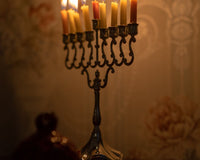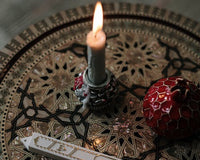713 letters. Two biblical passages. One tiny scroll.
A mezuzah is a handwritten parchment scroll affixed to the doorpost of a Jewish home. It contains the Shema prayer from Deuteronomy 6:4-9 and 11:13-21. The word “mezuzah” literally means “doorpost” in Hebrew.
But it’s way more than a scroll on a door. It’s a declaration of faith. A covenant with God. And for millions of Jewish families, it’s the first thing they touch every morning.
Whether you’re buying your first Jewish mezuzah or just curious about the tradition, this guide covers everything. History. Rules. How to hang one. And what makes a mezuzah kosher.
Spoiler: the fancy case isn’t the important part.
Mezuzah at a Glance
|
Feature |
Details |
|
Hebrew Meaning |
“Doorpost” (מזוזה) |
|
Contains |
Shema prayer (Deuteronomy 6:4-9 and 11:13-21) |
|
Total Letters |
713 handwritten Hebrew characters |
|
Written By |
Sofer (trained Jewish scribe) |
|
Placement |
Right doorpost, upper third, tilted inward |
|
Material |
Parchment from a kosher animal |
|
Check Frequency |
Twice every 7 years minimum |
|
Back Inscription |
“Shaddai” (שדי) meaning Almighty |
Part 1: The History and Origins of the Mezuzah
This tradition didn’t start yesterday. It’s over 3,000 years old.
And it began with a direct commandment from God.
The Biblical Origin: Deuteronomy 6:9
The Torah is clear. “You shall write them upon the doorposts of your house and upon your gates.”
That’s Deuteronomy 6:9. It’s not a suggestion. It’s a mitzvah. A commandment.
Jewish tradition traces this commandment to the year 1312 BCE. Given at Sinai. Practiced ever since.
From the Desert to Canaan
Some scholars believe Jews were exempt from the mezuzah during the 40 years in the Sinai desert. Why? Their dwellings were temporary.
But once they settled in Canaan around 1272 BCE? The mezuzah became a permanent fixture. Every doorpost. Every home.
The Second Temple Period and Beyond
The earliest physical examples of mezuzahs date to the Second Temple period. That’s 516 BCE to 70 CE.
By medieval times, mezuzah cases became works of art. Gold. Silver. Precious stones. But the scroll inside? Always the same.
The Connection to Passover
Here’s something most people miss. The mezuzah tradition echoes the Exodus story.
Before the final plague in Egypt, God told the Israelites to mark their doorposts with lamb’s blood. The angel of death passed over those marked homes.
The mezuzah carries that same energy. A mark on the doorpost. Divine protection. A covenant.

|
Period |
Development |
Significance |
|
1312 BCE |
Commandment at Sinai |
Biblical origin established |
|
1272 BCE |
Settlement in Canaan |
Became permanent household fixture |
|
516 BCE-70 CE |
Second Temple era |
Earliest physical examples |
|
Medieval |
Ornate cases created |
Artistic expression of faith |
|
Modern |
Mass production begins |
Accessible to all Jewish homes |
Part 2: What’s Inside a Mezuzah (and Why It Matters More Than the Case)
Most people focus on the case. That’s the wrong part.
The scroll inside is everything. Without a proper scroll, a mezuzah is just decoration.
The Klaf: The Sacred Parchment Scroll
The scroll is called a “klaf.” It’s made from parchment of a kosher animal. Usually goat or cow.
A trained scribe (called a “sofer”) writes every letter by hand. With a special quill pen. In black ink.
There are 713 letters total. If even one letter is wrong or missing? The entire scroll is invalid.
What’s Written on the Scroll
Two passages from Deuteronomy. That’s it.
Deuteronomy 6:4-9 (The Shema)
“Hear, O Israel, the Lord is our God, the Lord is One.”
This is the most important prayer in Judaism. It declares God’s unity. And commands love for God with all your heart, soul, and might.
Deuteronomy 11:13-21 (The V’ahavta)
This passage promises blessings for following God’s commandments. Rain in season. Abundant harvests. Long life.
It also warns of consequences for turning away. Both sections end with the instruction to write these words on your doorposts.
The Hidden Word: Shaddai
Flip the scroll over. On the back, one word: “Shaddai.”
It means “Almighty.” But it’s also an acronym. Shin-Dalet-Yud. “Shomer Daltot Yisrael.” That translates to “Guardian of Israel’s Doors.”
This is why you see the Hebrew letter Shin (ש) on most mezuzah cases.
|
Component |
Requirement |
Why It Matters |
|
Parchment |
From a kosher animal |
Fulfills Torah requirements |
|
Ink |
Special black ink only |
Must be permanent and clear |
|
Scribe |
Trained sofer (certified) |
Ensures accuracy of 713 letters |
|
Writing Order |
Must be written in sequence |
Errors can’t be fixed out of order |
|
Back Inscription |
Shaddai (שדי) |
Guardian of Israel’s Doors |
|
Case |
Any material allowed |
No religious requirements for the case |
Kosher vs Non-Kosher Scrolls
This is where people get confused. Not all mezuzah scrolls are kosher.
A kosher scroll is handwritten by a certified sofer on proper parchment. It’s inspected by a second scribe before sale.
Printed scrolls or those with errors don’t meet Jewish law requirements. They’re fine for display. But they don’t fulfill the mitzvah.
When you buy a mezuzah with scroll, always check whether the scroll is kosher or decorative.
Part 3: How to Hang a Mezuzah the Right Way
Placement matters. There are specific rules. Get them wrong, and you haven’t fulfilled the commandment.
But don’t stress. It’s simpler than you think.
Which Doorposts Need a Mezuzah?
The front door. Always. That’s the most important one.
After that? Every room where you eat or sleep. Bedrooms. Dining room. Kitchen. Living room.
Rooms That Don’t Need One
Bathrooms. No. Closets smaller than 39.6 square feet. No. Laundry rooms. No.
The rule is simple. If you wouldn’t consider it a living space, skip it.
Exact Placement on the Doorpost
Right side. Your right as you walk into the room.
Position it at the bottom of the upper third of the doorframe. Roughly shoulder to eye height.
The Angle: Ashkenazi vs Sephardic
Here’s where the two traditions differ.
Ashkenazi Jews tilt the mezuzah at an angle. Top pointing inward toward the room. This is the most common practice in America.
Sephardic Jews place it vertically. Straight up.
Both are valid. The angled approach actually comes from a compromise between two medieval rabbis, Rashi and Rabbenu Tam.
The Blessing When You Affix It
Before nailing it up, recite this blessing:
“Baruch atah Adonai, Eloheinu Melech haolam, asher kid’shanu b’mitzvotav v’tzivanu likboa m’zuzah.”
Translation: “Blessed are You, Lord our God, Ruler of the universe, who has sanctified us with His commandments and commanded us to affix a mezuzah.”

|
Room |
Mezuzah Required? |
Notes |
|
Front entrance |
Yes (most important) |
Always do this one first |
|
Bedrooms |
Yes |
Rooms where you sleep |
|
Kitchen |
Yes |
Room where you eat |
|
Living room |
Yes |
If it has a doorframe |
|
Dining room |
Yes |
Room where you eat |
|
Home office |
Yes |
If used regularly |
|
Bathroom |
No |
Never place on bathroom doors |
|
Small closets |
No |
Under 39.6 sq ft exempted |
|
Garage/shed |
Maybe |
If 39.6+ sq ft with proper doorway |
Part 4: Why the Mezuzah Matters So Much in Jewish Life
A mezuzah isn’t a decoration. It’s not a lucky charm. It’s a statement.
It says: “This is a Jewish home. God is present here.”
A Declaration of Faith and Identity
The traditional mezuzah is the hallmark of a Jewish household. It’s been that way for over 3,000 years.
When visitors see a mezuzah on the doorpost, they know instantly. This family lives by Jewish values.
For many Messianic Jews, the mezuzah carries additional significance. It connects Old Testament tradition with personal faith.
Divine Protection Over the Home
The Talmud records God saying: “If a man affixes a mezuzah, I will guard his house.”
Jewish families believe the mezuzah invites God’s watchful care. Whether you’re inside or outside the home.
The word Shaddai on the scroll’s back reinforces this. Guardian of Israel’s Doors. That’s not symbolic. It’s personal.
The Tradition of Touching and Kissing
Watch any observant Jewish family leave their home. They’ll touch the mezuzah. Then kiss their fingertips.
It’s a daily act of devotion. A moment of connection. A prayer before stepping into the world.
This practice dates back to the Middle Ages. But it feels timeless.
A Meaningful Gift for Jewish Families
Moving into a new home? A mezuzah makes the perfect gift. It’s thoughtful. Personal. And deeply meaningful.
It says: “May this home be blessed.” That’s better than a gift card.
Other perfect occasions? Weddings. Bar and bat mitzvahs. Housewarmings. Or simply because.
|
Occasion |
Why a Mezuzah Fits |
Suggested Style |
|
New home |
Blesses the household |
Olive wood or brass |
|
Wedding |
Symbolizes a new beginning |
Ornate metal or silver |
|
Bar/Bat Mitzvah |
Marks responsibility to mitzvot |
Personalized or modern |
|
Housewarming |
Universal Jewish gift |
Simple, elegant design |
|
Just because |
Shows love and faith |
Handmade from the Holy Land |
Part 5: Types of Mezuzah Cases (and How to Choose)
Remember: Jewish law has zero requirements for the case. Only the scroll matters legally.
That said? The case is where personal style meets faith.
Olive Wood Mezuzahs
Carved from olive trees in the Holy Land. Olive wood has deep biblical significance.
It’s warm. Natural. And each piece has unique grain patterns. No two are identical.
Olive wood mezuzahs are popular as gifts because of their connection to the land of Israel.
Metal and Brass Mezuzahs
Durable. Elegant. Built to last decades.
Brass mezuzahs work well for front doors. They handle weather better than wood or ceramic.
Many feature engravings of Jerusalem scenes, the Star of David, or Hebrew blessings.
Ceramic and Artistic Mezuzahs
These are the statement pieces. Hand-painted. Colorful. Often one-of-a-kind.
They’re popular for interior rooms where they’re protected from weather.
Messianic Mezuzahs
Messianic mezuzahs include the Messianic Seal. A menorah, Star of David, and fish symbol combined.
These are meaningful for Messianic Jewish families. Same scroll inside. Different case design.

|
Material |
Durability |
Best Location |
Price Range |
Style |
|
Olive Wood |
Medium |
Interior doors |
$15-$40 |
Warm, biblical |
|
Metal/Brass |
High |
Front door, exterior |
$20-$80 |
Classic, elegant |
|
Ceramic |
Low-Medium |
Interior only |
$25-$100+ |
Artistic, colorful |
|
Silver |
High |
Display, special rooms |
$50-$200+ |
Luxury, heirloom |
|
Plastic/Acrylic |
Medium |
Any door |
$5-$15 |
Budget-friendly |
Part 6: Mezuzah Maintenance and Care
You don’t just hang it and forget it. A Jewish mezuzah needs attention.
Think of it like a living tradition. It requires care.
The Twice-in-Seven-Years Rule
Jewish law requires inspection of the scroll at least twice every seven years.
Remove the scroll. Unroll it gently. Check for faded letters. Cracks. Water damage. Insect damage.
If any letter is damaged or illegible? The scroll may no longer be kosher. Get it checked by a sofer.
What to Do With a Damaged Scroll
Don’t throw it away. Ever. It’s a sacred object.
Bring it to a synagogue. Damaged scrolls go into a Genizah (a sacred storage room). They’re eventually buried in a Jewish cemetery.
Then affix a new scroll in its place.
Protecting the Case From Weather
Outdoor mezuzahs face rain, sun, and temperature swings.
Metal cases hold up best. Make sure the seal is tight. Moisture is the scroll’s worst enemy.
Check outdoor mezuzahs more often than indoor ones.

The Bottom Line
713 letters. One commandment. 3,000+ years of tradition.
A mezuzah turns a house into a Jewish home. It’s faith you can touch every single day.
Ready to find yours? Shop handmade mezuzahs from the Holy Land. Your doorpost is waiting.
Frequently Asked Questions About Mezuzahs
What is a mezuzah in simple terms?
A scroll on your doorpost.
It contains the Shema prayer from the Torah. Handwritten in Hebrew on parchment. Enclosed in a decorative case.
It’s the mark of a Jewish home. Learn more about mezuzah history here.
Can non-Jewish people have a mezuzah?
Yes. Absolutely.
Many non-Jewish people appreciate the tradition. Some keep mezuzahs on their homes out of respect for previous owners.
There’s no rule against it. It’s welcome.
How much does a mezuzah cost?
Cases run $5 to $200+. Depends on the material.
A kosher scroll costs $30 to $60 on average. The scroll is the investment. Don’t cheap out on it.
Which side of the door does a mezuzah go on?
Right side. Always.
You're right as you walk into the room. Upper third of the doorframe. Tilted inward (Ashkenazi) or vertical (Sephardic).
Do I need a mezuzah on every door?
Almost. Not bathrooms, though.
Every room where you eat or sleep needs one. Front door is the priority. Check out our 5 common mezuzah questions for more details.
How do I know if my mezuzah scroll is kosher?
Ask the seller. Simple.
A kosher scroll is handwritten by a sofer on animal parchment. It’s inspected before sale. Browse authentic mezuzahs here.
|
Question |
Quick Answer |
|
What is a mezuzah? |
A Torah scroll on your doorpost |
|
Can non-Jews have one? |
Yes, it’s welcome |
|
How much does it cost? |
$5-$200+ (case) + $30-$60 (scroll) |
|
Which side of the door? |
Right side as you enter |
|
Every door? |
Yes, except bathrooms |
|
How to check if kosher? |
Must be handwritten by certified sofer |





